Explore Top Quality and Worth: Your Overview to Acquiring a Pre-owned Engine
When taking into consideration the acquisition of a pre-owned engine, understanding the detailed equilibrium between high quality and worth is vital. A detailed analysis of engine background, condition, and integrity is necessary to make sure an audio investment.
Understanding Engine Kind
When taking into consideration the acquisition of a pre-owned engine, comprehension of the different engine kinds is essential for making an informed choice. Engines can normally be classified into two main kinds: internal burning engines and electrical engines. Internal burning engines, that include gas and diesel versions, depend on the combustion of fuel to produce power. Fuel engines are commonly lighter and rev greater, making them suitable for efficiency automobiles, while diesel engines are renowned for their torque and gas performance, typically favored in durable applications.
On the other hand, electric engines use electrical power stored in batteries to power the automobile, supplying a cleaner option with fewer moving components and minimized upkeep needs. Within these categories, there are better distinctions, such as two-stroke versus four-stroke interior combustion engines, and various electrical motor setups.
Comprehending these distinctions is essential, as they influence performance, compatibility with existing car systems, and long-lasting operational prices. By familiarizing oneself with the numerous types of engines offered, potential customers can much better evaluate their demands and make options that straighten with their vehicle's needs and their personal choices.

Reviewing Engine Problem
A thorough evaluation of engine condition is extremely important for anybody thinking about the purchase of a pre-owned engine. Start with an aesthetic examination; look for signs of oil leaks, deterioration, or any physical damages to the engine block. A clean engine is typically a sign of excellent maintenance practices, while too much crud may suggest disregard.
Next, evaluate the engine's components, consisting of the timing belt, gaskets, and seals. Seek damage, as these parts can be costly to change. Additionally, check out the engine installs, as damaged mounts might bring about vibrations and further mechanical concerns.
A compression test is vital to evaluate internal engine wellness. Consistent compression across all cyndrical tubes suggests a well-kept engine, whereas significant disparities may point to inner damages or wear.
Listening to the engine during a startup can supply important understandings; any unusual sounds, such as knocking or rattling, might recommend much deeper problems. If possible, request an examination run to evaluate performance under tons. By thoroughly evaluating these factors, prospective customers can make informed choices and protect a quality pre-owned engine.
Checking Engine History
Understanding the engine's background is important for making an educated acquisition. Knowledge of previous use, upkeep documents, and any past problems can dramatically affect the engine's reliability and durability. Begin by requesting the automobile identification official site number (VIN) or engine serial number, which enables you to map the engine's history.
Utilize readily available resources, such as Carfax or AutoCheck, to obtain an automobile history record. This report will provide important insights, consisting of mishap background, service records, and previous ownership details. Toyota RunX RSI. Pay particular attention to any type of indicators of extreme damages or repeated repairs, which might indicate underlying issues
Ask about upkeep routines done on the engine. Routine oil changes, timing belt replacements, and other safety nets show accountable ownership. Furthermore, ask if the engine has gone through any modifications, as non-standard modifications can influence efficiency and compatibility with your automobile.
Lastly, ideally, seek verification from a relied on mechanic who can assess the engine's problem based upon its background (Toyota RunX RSI). This detailed examination will help you prevent prospective pitfalls and make sure that your investment is rewarding and sound
Warranty and Return Policies
Acquiring a used engine typically comes with differing guarantee and return plans that can significantly impact your choice. When thinking about a made use of engine, it is vital to thoroughly examine the service warranty options provided by the vendor.

Additionally, reliable vendors commonly give paperwork that outlines the service warranty and return process, guaranteeing openness. Constantly request this details prior to completing your purchase. A well-defined guarantee and return policy can provide peace of mind and protect your investment, making it an indispensable component of the decision-making procedure when acquiring a pre-owned engine.
Finding the most effective Deals
When seeking the very best offers on a pre-owned engine, it is important to carry out comprehensive research study and compare prices from various sellers. Start by exploring on-line markets, automotive discussion forums, and neighborhood salvage lawns to gather a thorough understanding of the marketplace. Using price contrast tools can streamline this procedure, highlighting competitive prices across various systems.

Take into consideration timing your acquisition strategically. Seasonal fluctuations popular can impact costs, with specific times of the year supplying better bargains. Additionally, be open to discussing prices; many vendors might want to decrease their asking cost, particularly if the engine has actually been detailed for a prolonged period.
Conclusion
In summary, acquiring a used engine requires a detailed assessment of high quality and worth. Assessing engine problem through tests and evaluations, confirming its background, and recognizing warranty and return policies are crucial steps. In addition, comparing prices throughout various sellers makes sure the ideal financial choice. By sticking to these standards, purchasers can enhance their opportunities of obtaining a trustworthy engine that meets their requirements while preventing possible risks related to second-hand acquisitions.
When taking into consideration the acquisition of a pre-owned engine, comprehension of the numerous engine kinds is vital for making an educated decision. Engines can generally be categorized right into two major kinds: internal burning engines and electrical engines. Gasoline engines are typically lighter and rev greater, making them ideal for efficiency cars, while diesel engines are renowned for their torque and gas performance, frequently preferred in durable applications.
A thorough evaluation of engine condition is paramount for anybody taking into consideration the acquisition of a used engine. Beginning by asking for the car recognition number (VIN) or engine serial number, which enables you to trace the engine's history.